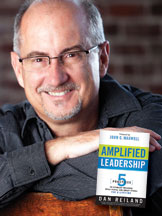By Ronald E. Keener
 If you want to produce a harvest of leaders who are ripe for the task of Kingdom building, the work will have to start in you. “A spiritual leader must live a life worth being replicated,” writes Dan Reiland in Amplified Leadership, published by Charisma House. He is executive pastor at 12Stone Church, Lawrenceville, GA.
If you want to produce a harvest of leaders who are ripe for the task of Kingdom building, the work will have to start in you. “A spiritual leader must live a life worth being replicated,” writes Dan Reiland in Amplified Leadership, published by Charisma House. He is executive pastor at 12Stone Church, Lawrenceville, GA.
The book, says Reiland, was born out of years leading in local churches and coaching pastors. Hence, it offers proven and practical principles – not theories – to help churches continually develop new leaders. Reiland shares with Church Executive some of these principles.
How do you live “trust” with your team?
Trust means we can count on each other. We assume the best and give the benefit of the doubt. We also know that even among the best teams, trust doesn’t perpetuate itself, it must be cultivated. So if there is ever a question or an issue, we ask rather than pretend everything is okay.
You say your team is a “combination of a posse and a rock band.” What do you mean by it?
We are not a conventional bunch. We have more rebel in us than perhaps is good, and we consider sarcasm a spiritual gift. But for us, that’s part of the magic. Yes, we are a combination of rock band and posse. We hear and make our own “music” regardless of what is currently popular, and if you try to hurt anyone on the team, you better be looking over your shoulder because there’s a wild bunch coming after you! We really do watch out for and protect each other.
You say of your team that you genuinely like each other. Any stumbles in getting to that point, or are you just lucky?
We might be lucky, but I think we work hard on hiring well. It doesn’t always work out perfectly, but we’ve learned to focus heavily on chemistry. Character and competence are important, but they are in many ways a given. Chemistry is the difference maker! If someone just doesn’t fit, we don’t try to force it no matter how talented they are.
Do you still like each other as much after performance evaluations?
Yes, we do! We don’t do evaluations in the traditional sense. We call ours “coaching conversations,” and they are based on shared goals, communicating expectations, and bringing out the best. We use them to coach the team and develop them as leaders. People want to talk about that stuff! It’s true that no one likes how much time and effort they take, but they do like the results.
What is it about yourself that seems to work best with others, or are you just a teddy-bear of a guy who everyone loves?
I’m not a teddy-bear. In fact of all the adjectives used to describe me, several of which you can’t put in print, that would not be on the list. Candidly, I’m very driven and I have high standards. The team would say they know I care about them — and I really do.
What do others seem to do wrong in establishing relationships with their team members?
Making assumptions and jumping to conclusions are two big ones. E-mail gets teams in trouble, too. You’ve just got to have face time and keep it real.
What else might you want to say about relationships on staff?
Don’t try to force it. You can’t legislate relationship. You just can’t be buddies with everyone. Be yourself. People like you best that way. Our rule of thumb is: “Close to a few, Connect with all, and Conflict (unresolved) with none.”


